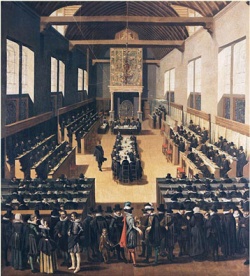The Canons of Dort, Second Head of Doctrine, Article One
 Thursday, August 21, 2008 at 04:01PM
Thursday, August 21, 2008 at 04:01PM  The Second Main Point of Doctrine
The Second Main Point of Doctrine
Christ's Death and Human Redemption Through It
Article 1: The Punishment Which God's Justice Requires
God
is not only supremely merciful, but also supremely just. His justice
requires (as he has revealed himself in the Word) that the sins we have
committed against his infinite majesty be punished with both temporal
and eternal punishments, of soul as well as body. We cannot escape
these punishments unless satisfaction is given to God's justice.
______________________________________
Under
the first head of doctrine, the authors of the Canons completed their
treatment of human sinfulness (total depravity) and divine mercy
(unconditional election), commonly known as the first two points of
Calvinism.
In the first
head, it was clearly established that all men and women have fallen in
Adam, and are not only guilty because Adam acted as their divinely
chosen representative so that the guilt of Adam's sin was imputed (or
reckoned, or accounted) to them, but they are also guilty for all of
their own sinful actions which spring forth from sinful human nature.
This
is what we mean when we speak of “total depravity.” This does not
mean that all of us are always as bad as we can possibly be, only that
sin has infected us in our entire person, from head to toe, and that
there is no part of human nature that is not tainted, stained, or
corrupted by the consequences of the fall of our race into sin.
To
use a biblical analogy, we are by nature not only children of wrath
(Ephesians 2:3), we are the kind of bad trees described by Jesus in
Matthew’s gospel (7:15 ff.) who can only bear bad fruit. This is, as
our Lord tells us, the visible manifestation of our hidden wickedness
and depravity.
On a
practical level this means that we are born in sin, and apart from
God's grace, our wills are in bondage to our sinful nature, and we can
only use the good gifts which God has given to us for sinful
(self-centered) purposes. Lacking faith, we cannot please God (Hebrews
11:6). We sin because we are sinners. We sin because we like to sin.
And since the wages of sin is death, we are all subject to the curse.
Left on our own, and to our own devices, we do not want Jesus as our
Lord. Instead, we desire to be lord of our own lives, and so we go our
own way. We are not overly concerned about God showing his mercy to
us, since we do not think that we really need it, and since we believe
that somehow God is obliged to give it to us any way.
To read the rest of this article, Click here: Riddleblog - Notes on the Canons of Dort (Second Head)


Reader Comments (2)